The Fantasy Trip: Legacy Edition — Dungeon master and commander
It’s not every day that you’ll see a re-release like The Fantasy Trip: Legacy Edition. In fact, it’s a game — or rather a system — that I think will surprise a lot of people with both its accessibility and it’s flexibility.
As the re-release of a Steve Jackson classic, The Fantasy Trip has all the smart writing and straightforward systems that you would expect, but how does it compare to more modern RPG systems, including Dungeons & Dragons, that have grown in popularity since it’s original release?
Firstly, let’s talk about what’s in the box. The Legacy Edition of The Fantasy Trip equates to almost ten kilo’s of cardboard tokens, paper maps, manuals and other supporting paraphernalia. The version of the game represents the flagship of Steve Jackson Games’ 2019 re-release and includes all of the available content, which is quite a considerable collection.
In more specific detail, you’ll find the original boxed minigames known as Melee and Wizard, as well as a similar, slightly more advanced boxed game that merges The Death Test and its sequel into a single product. There is also a large, thick booklet that combines several standalone releases from the original line, including The Labyrinth, Advanced Melee and Advanced Wizard. Much of the original text and imagery is unchanged as I understand it, but this new version provides a much more straightforward and accessible layout. Finally, at least in terms of headline content, there’s a large, advanced quest called Tollenkar’s Lair, which comes complete with its own maps.
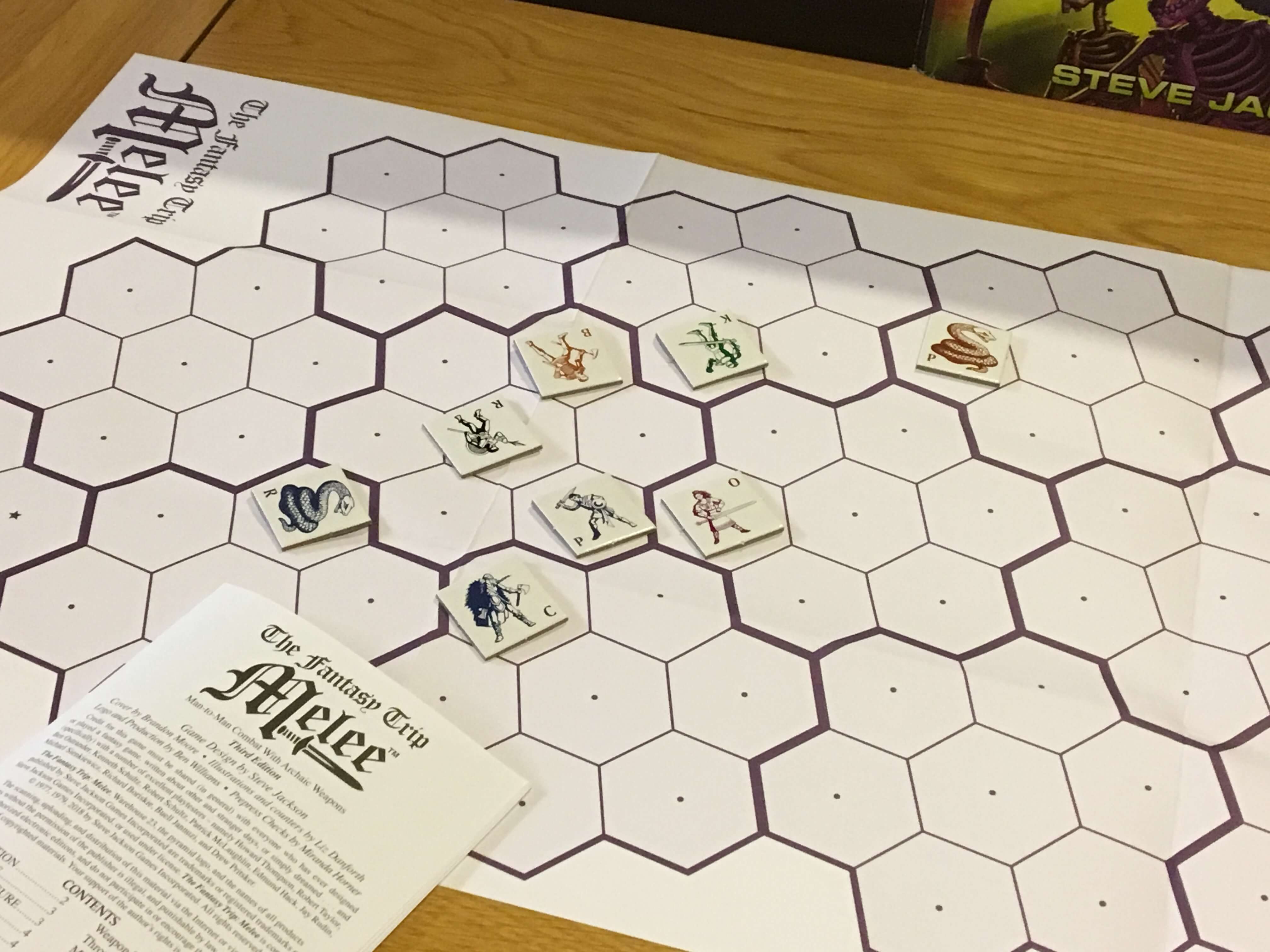
Whilst these boxed games, booklets and adventures combine to provide the bulk of the actual content — which takes the form of both a straightforward RPG system and a series of pre-baked encounters and adventures — there’s a lot more stuff contained in the sizeable box. Notably, there is easily the largest and most detailed Dungeon Master screen that I’ve ever seen, as well as a large number of tokens, character pads, premade characters, dice and much more. There’s even a quick start guide that explains how players should work their way through each of the products by order of complexity.
Starting on that note, it is indeed wise to begin with Melee, then Wizard. Even when it was first released, The Fantasy Trip was always intended to be a more accessible RPG system than its rivals, and that is certainly true if you and your group chose to begin with the more straightforward boxed games. Melee, for example, offers the perfect introduction to pen and paper RPG’s of this sort, by providing a very simple set of rules for setting up a fight between two teams of up to five players. Rules for movement and basic weapons are introduced, alongside character creation and management in game.
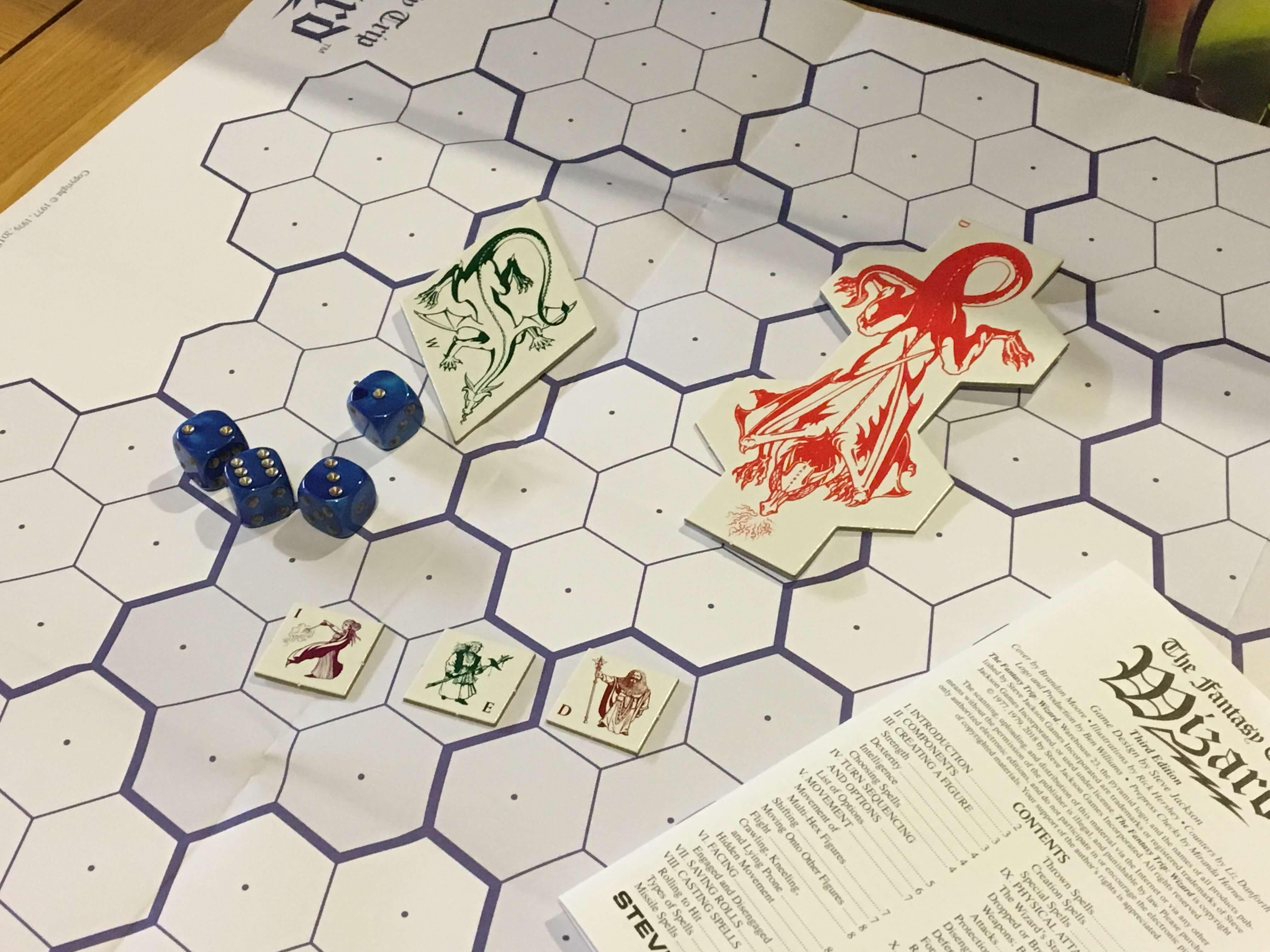
When Wizard is introduced, spells are brought into the mix, as well as more interesting creatures such as dragons, giants and monsters. Melee focuses only really on the strength and dexterity attributes, whilst Wizard brings IQ into the mix and layers in more complex rules to do with movement, including flight. Characters who use magic are capable of summoning, so you can imagine how complexity ramps up with multiple characters in play, spells and complex enemies.
With a sound footing in basic movement, combat and spellcasting, the party will be ready to gather themselves and venture forth into more complex, prebaked adventures like The Death Test and The Death Test 2. Both of these individual quests are pre-configured and come with a manual that sets the scene with quite a lot of story text and some specific rules, as well as various maps and layouts. Inside the Legacy Edition, players will find a large number of dry-erase tiles that can be used to form dungeons, as well as tokens for monsters, heroes and environmental effects to put out onto them.
The Death Test adventures can actually be played entirely by the player party, with no need for a Dungeon Master. This enables all players to learn at the same pace without anyone needing to understand the rules at a more complex level, or to manage rules and circumstances that are not accounted for by the game. Assuming that you still have a willing party after these adventures are over, someone is likely to need to take on the responsibility for running the game in future, because games like Tollenkar’s Quest are much more complex. Beyond that, players will be building their own adventures in any case, which will always require a DM.
At this point, I have to admit that my time as a Dungeon Master both within The Fantasy Trip and outside it is fairly limited when it comes to “proper” RPG’s. I’ve DM’d a few Dungeons & Dragons campaigns though, and as the owner of many games, I’ve also led teams of adventurers through boxed games, including everything from Descent and Mansions of Madness to Heroquest in my time. My experience of good DM’s is an ability to adapt to the needs of the players, whether that be their skill level, the things that appear to be turning them on throughout the quest, or some other unexpected need.
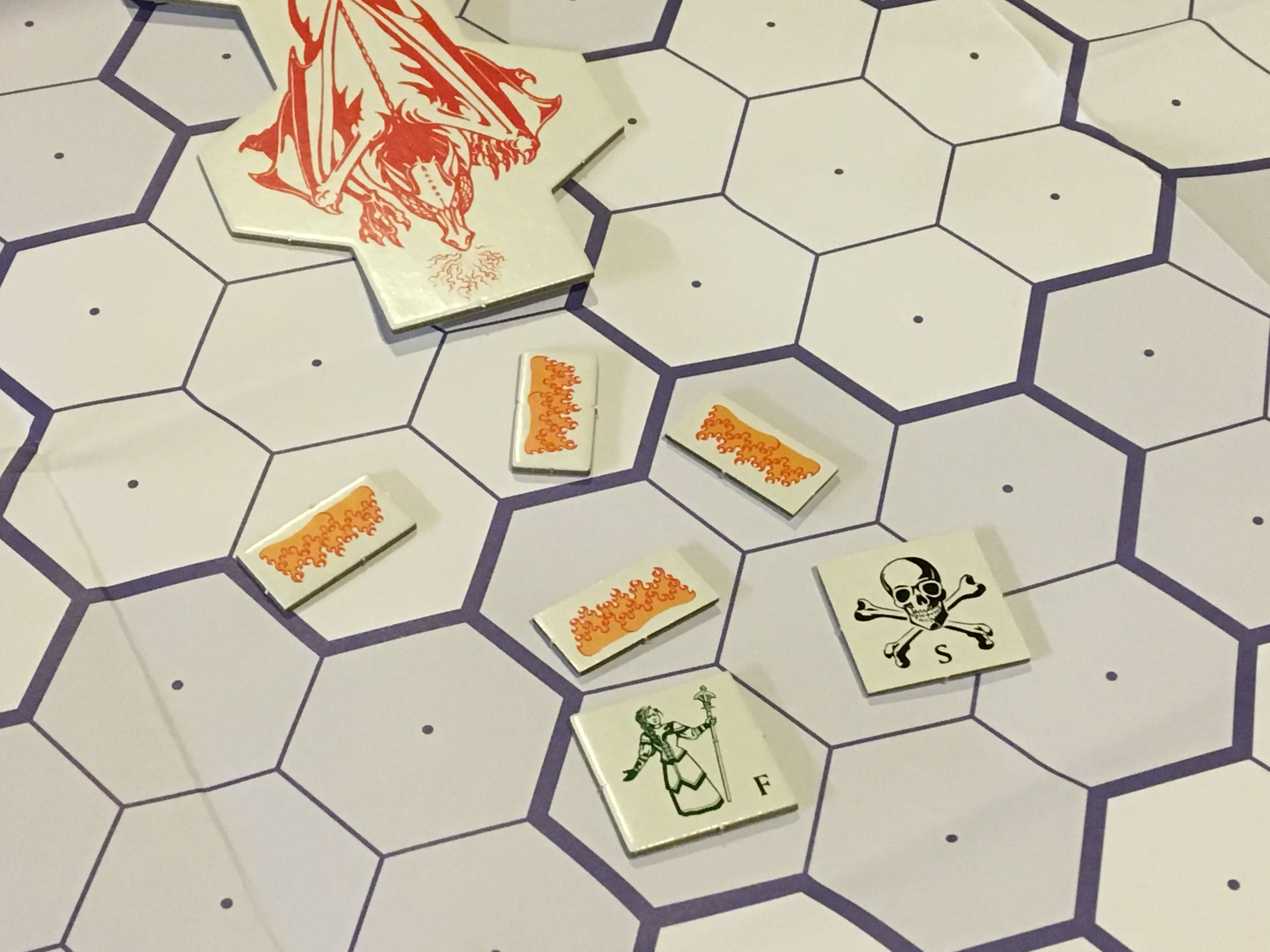
The hallmark of a good roleplaying system, then, is to support the DM in enabling an experience that is appropriately challenging, powerful enough to allow for any circumstance and, most importantly, supportive of having fun. Having designed a couple of short campaigns with it, I can confirm that The Fantasy Trip does these things well, and it is certainly easier to dive into the art of game crafting than it is elsewhere. I felt with The Fantasy Trip that I had as much power to create my world as I’ve seen in any game, but that there was an inherent simplicity that encouraged me to be more adventurous in my designs.
This, I think, harks back to one of Steve Jackson’s original design objectives, which was to build much of the experience around player choice (such as using points to build a character rather than random die rolls) and to minimise complex and highly variable outcomes by channeling much of the experience through one or more D6 outcomes, rather than D20. I haven’t delved deep into my own adventures yet, but I have been able to frame them up, plan them and deliver the first few scenes using the dry-wipe boards that come bundled in The Fantasy Trip, which is all good.

Given that pen and paper roleplaying is experiencing something of a resurgence at the moment, I’m quietly positive about what The Fantasy Trip offers. As an overall package, the Legacy Edition is exceptional value, offering more ready made content (in terms of boxed games and adventures) than many of its peers right out of the box, but also because it includes a role playing system that is accessible enough for relatively novice dungeon masters to come to terms with.
There’s really nothing in the way of gatekeeping to overcome here, thanks to the ease of character creation and the simplicity by which spells and abilities are learned and cast. Everything is driven by the central attributes that are outlined in Melee and Wizards, so if you do begin your journey and progress through it in the logical way that The Fantasy Trip intends, then it’s almost impossible to go wrong. Tollenkar’s Lair introduces everything a burgeoning DM needs to know in order to design their own adventure, but it does it in such a way that is accessible and fun.
I feel that I’ve barely even begun to understand the power of The Fantasy Trip system, but I’m excited about using it to expand upon the adventures that I’ve already built, as well as the characters that have been created within them. I think that this is the essence of a good role playing game — when the DM is able to use the tools provided to create worlds that are fun for everyone to fight through. The Fantasy Trip is certainly such a system, but even if you come into with no experience in role playing, there is enough in this expansive box to enable you to work up to the DM level at any pace you’d like. The Fantasy Trip is, without doubt, the complete toolkit for any would-be adventuring party.
A copy of The Fantasy Trip was provided for review purposes, and you can read more about it on the Steve Jackson Website.
Love board games? Check out our list of the top board games we’ve reviewed.

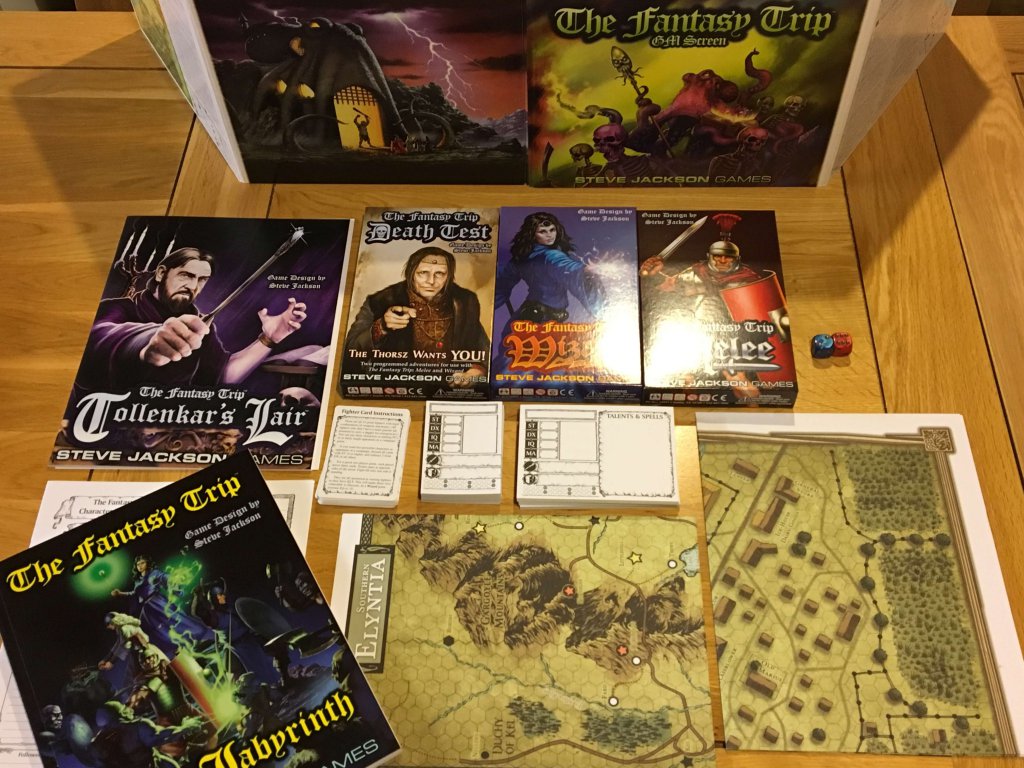
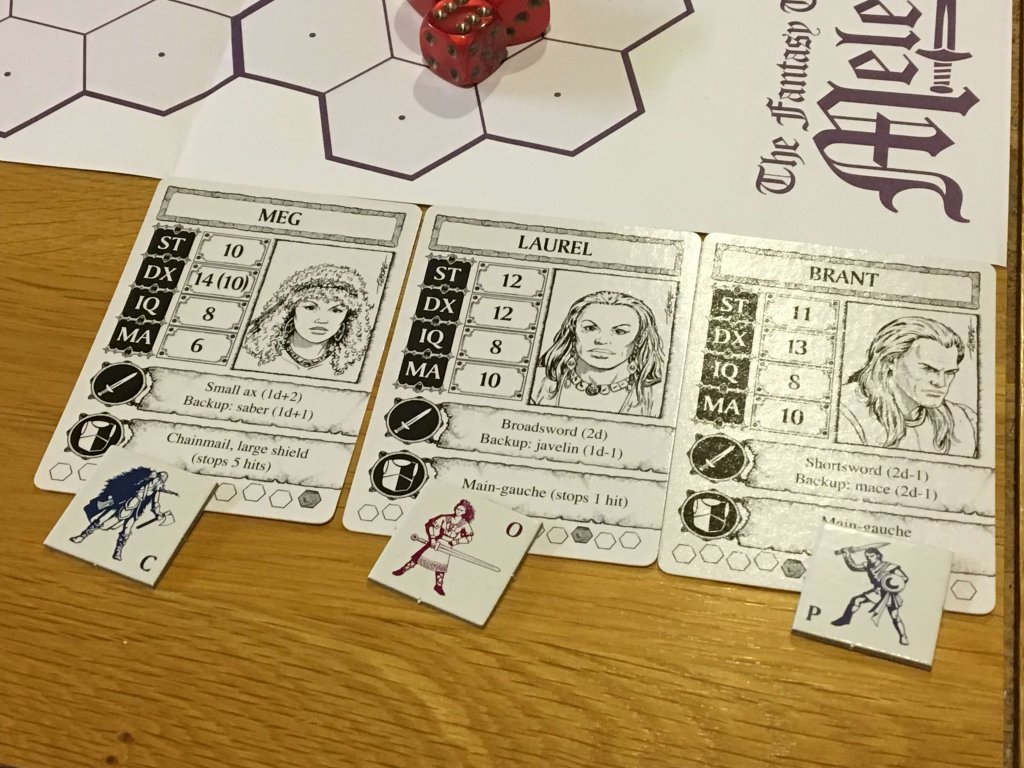
I love this review. Now that considerable time has passed since you wrote it, I’d love to read an updated post after you had more time to explore the system. Also, TFT users have a Discord group (click the Discord logo at https://thefantasytrip.game to get there), and I’d love you to join us. Thanks for posting!
Thank you Tollenkar, I will check out the Discord with interest. As it happens I’ve hardly advanced my knowledge/experience with the game due to the lack of playtime (of any game really) over the past 12-18 months, but thankfully things are returning to “normal” now so I may well pick it up again. I appreciate the kind words and hope to see you soon.